What I'm Making This Week
3 new recipes and an honest guide to egg freezing
freezing my eggs was one of those decisions that didn’t come with a clear “yes.” it was more like a quiet nudge that grew louder over the months; the sense that i wasn’t ready for kids yet, but didn’t want that to mean i was out of time.
so i started asking questions and making appointments. and then i stopped. and a year later started again. there are huge financial and educational barriers that make this process feel impossible to navigate. i wish i’d had a straightforward guide to read while i was deciding… something that explained what to expect without all the jargon and fear. instead, it took me over a year to finally go through with it, mostly because i was confused, scared, and financially stressed.
this week, i’m sharing the food i made while my body was working overtime. three recipes that helped me feel grounded and nourished through my egg freezing process. plus!! honest answers about what it’s actually like to do this at 32 years old.
some parts of this story are logistical (cost, process, recovery) and others are deeply personal. i want this to be as accessible as possible, so all practical info and recipes are free. the emotional parts, the what it felt like, live below the paywall.
if you’re reading this because you’re curious, considering freezing, or just here for the recipes, i hope you find something that helps you feel less alone.
What I’m Making This Week
3 recipes i made before & after my procedure. you don’t have to be freezing your eggs (or even thinking about it) to make them. they’re just simple, grounding meals that make you feel good in your body.
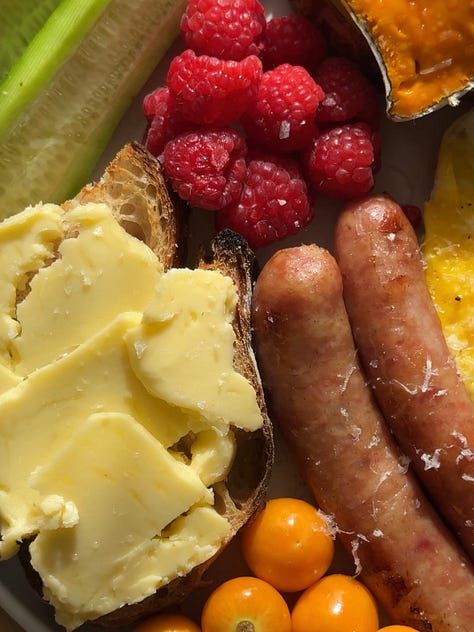
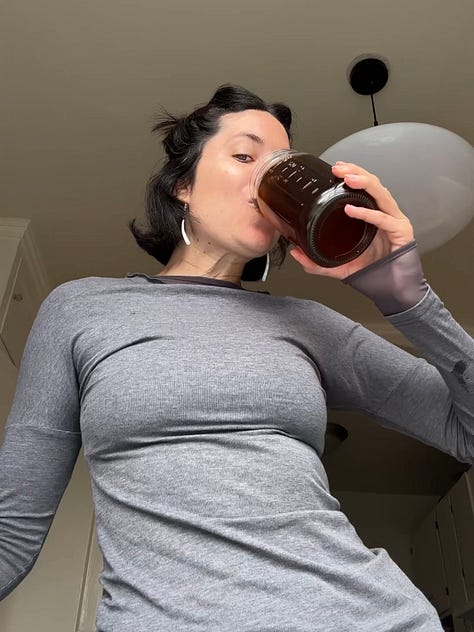
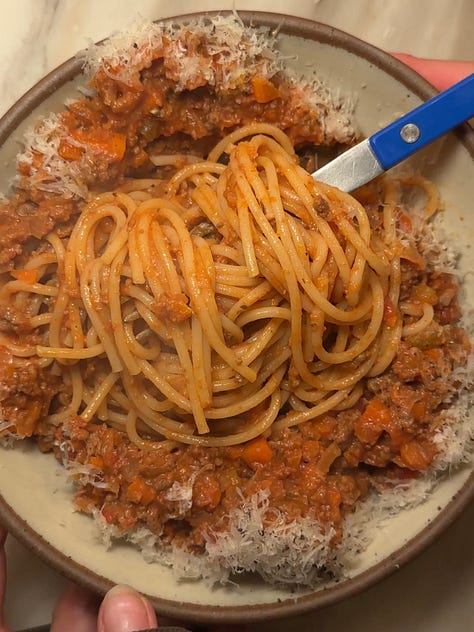
Breakfast Snacking Plate
i was told to have salty foods post procedure - this is a plate of all the foods i craved in the morning while recovering. GET THE FREE RECIPE HERE!
Mineral Herbal Tonic (Womb Tea)
a big batched iced tea (that can also be enjoyed hot) to replace my morning coffee, reduce inflammation & nourish my nervous system. GET THE FREE RECIPE HERE!
Easy One-Hour Bolognese
an insanely delicious & cozy dinner to replenish iron levels with tons of protein, carbs & fiber. the sauce can be frozen and prepped for the days you just can’t cook. GET THE FREE RECIPE HERE!
sharing all of this feels equal parts vulnerable and freeing. i know how confusing and isolating it can feel to make decisions about your fertility, and if you’re reading this while weighing your own options, i see you! i can’t give medical advice, but i can be a friend who’s been there. if you have questions or just need to talk it through, my comments and inbox are always open.
Q & A
i’ll be answering your questions to the best of my ability, but before we dive in, i want to note three things:
it’s a privilege to even be able to participate in a procedure like this. we all arrive at this process for different reasons and through different circumstances, and i want to hold space for that. my hope in sharing this is to help remove shame, reduce educational barriers, and offer a little transparency around what the experience can look like. i know this isn’t an option available to everyone, and i want to be mindful of that as i tell my story.
i’m not here to give medical advice! everything i share is based solely on my own experience. because of that, i won’t be including my specific results or numbers. if you’re looking for personalized guidance, it’s always best to talk directly with your doctor or a local fertility clinic.
this is a guide, not gospel. everyone’s body, finances, and emotional landscape are different. take what’s helpful, leave what’s not, and use this as a jumping-off point for your own research and conversations.
how did you choose your clinic (criteria, consultations, research)?
i first heard about Spring Fertility from a few people i knew who had gone through the process and loved it. when i realized there was a clinic only ten minutes from me, i decided to book a consultation.
at the time, i had no idea what to look for in a fertility clinic… it felt like learning a new language. now that i’ve gone through it, i’d say the most important things to look for are: a doctor you trust, professionalism, transparency, an accessible care team, and an overall sense of humanity. it’s such a vulnerable process, and you want to feel supported every step of the way.
two of my close friends had positive experiences with Spring, so that’s who i went with. and truly, they were wonderful. any time i had a question (which was often), i could call my care team and get an answer within minutes. during the injection phase, ultrasounds, and final retrieval, the process felt as seamless as it could; no long waits, clear communication, and kind doctors who made me feel cared for rather than like a patient on a conveyor belt. i am collaborating with Spring on an event here in SF (stay tuned for details!) but this post is in no way sponsored.
does insurance cover it?
this depends entirely on your job and insurance plan. if you’re employed, ask your HR team about fertility benefits and don’t be afraid to ask them to clarify the fine print.
most clinics also have a financial counselor who can help you understand what your specific coverage looks like and what your out-of-pocket costs might be. some employers partner with fertility programs like Carrot or Progyny, which can cover part or even all of the expenses, including multiple rounds of treatment. others might cover only a fraction of the cost.
how much does it cost + what’s included?
i’m pulling these numbers directly from the financial documents my clinic sent me (lol is this legal?) and they can vary depending on your medical history and the treatments you choose.
one thing that surprised me: if you’re doing anything involving embryos, you typically have to pay the full cost upfront before your procedure (no payment plans). but if you’re doing egg freezing only, there’s often a payment plan option.
here’s a rough breakdown:
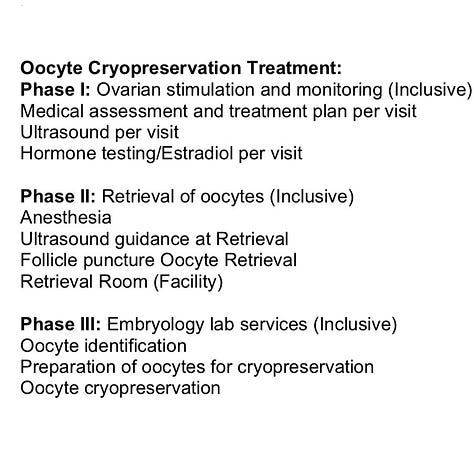
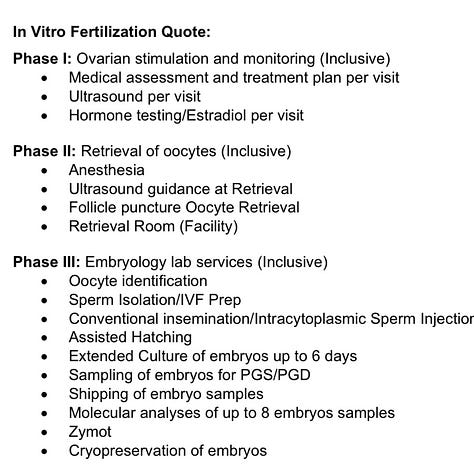
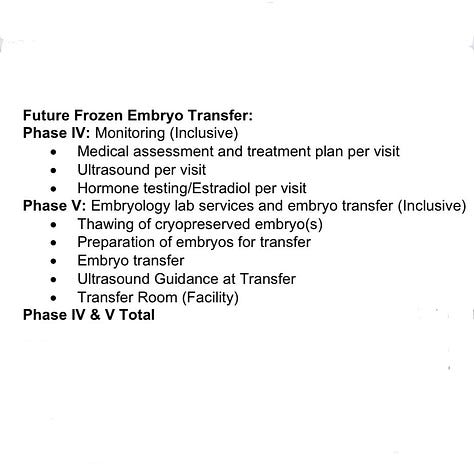
egg cryo (freezing eggs only)
phases I-III: $10,209 (photo on the left)
cryopreservation storage: $795 per year
embryo + egg cryo (freezing half eggs + half embryos)
phases I-III: $23,572 (photo in the middle)
phases IV-V: $5,526–$6,823 (photo on the right)
cryopreservation storage: $795 per year
genetic testing: $300 per embryo
in addition, you’ll need to purchase medication from a fertility pharmacy. not all pharmacies accept insurance (mine didn’t), and my total was $4,100. medication costs vary based on your body’s needs and your doctor’s protocol.
do they take all of your follicles forever?
this was one of my biggest questions too!! and the answer is no. every menstrual cycle produces a new set of follicles. as we age, the number and quality of those follicles decline, which is part of why fertility decreases over time.
so if you go through an egg retrieval, your body will still produce new follicles in future cycles. in other words, you can go through this process and still try naturally later if you choose to.
what did the overall timeline look like?
8/13: initial consultation + ultrasound to count follicles and estimate potential yield. we also chose a date that i would begin treatment.
9/11: started my period, which needed to be delayed, so i was put on birth control (for the first time in 5 years… nightmare, more on that below).
9/15: attended a 90-minute medication teaching webinar. educational but completely overwhelming. i cried afterward because it all felt so clinical and intense.
9/16: baseline ultrasound + first night of hormone injections.
9/16–9/26: nightly hormone injections, plus four monitoring ultrasounds to track follicle growth and adjust dosages.
9/27: took my “trigger shot” to prepare my body for retrieval, followed by bloodwork to confirm hormone levels were where they needed to be.
9/28: retrieval day!!! arrived at 6:45am, procedure started around 8:00am, done by 9:15am.
what recovery was actually like + how long it took
for me, recovery took about two weeks. right after the procedure, i was exhausted, crampy, and a little spotty (which is normal). the first two days were the hardest. it hurt to walk, i felt extremely bloated and uncomfortable, and all i wanted to do was rest.
after a few days, i slowly started to feel better, and right as i did, i got my period (also normal). you’re expected to start within 4–12 days post-procedure. it was heavy and painful.
a lot of people say their emotional crash came during recovery, but my mental breakdown happened during the hormone phase. once it was over, i actually felt a sense of calm and relief. once my period was over i felt almost completely back to normal. the exhaustion lingered for another week.
how i prepared physically (nutrition, supplements, caffeine break, etc.)
preparing your body for egg freezing is personal. i don’t drink alcohol, and i also *tried* to cut back on caffeine and sugar about a week before starting hormones. i didn’t take any supplements; i just focused on eating balanced, grounding meals.
during the injection phase, my appetite disappeared completely, which threw off my plan. i ended up eating a lot of bread, butter, and soft, salty foods that felt easy on my stomach. eventually, i learned to stop forcing a “perfect” fertility diet and just listen to what my body needed each day.
what was it like doing injections at home?
i was so worried about this! at first, i thought it was insane that they’d give me the responsibility to do this on my own and the initial injection was scary and confusing. but honestly, once i started doing it each night it got easier and easier and was actually a really empowering experience.
was it worth it, financially and emotionally?
short answer: yes. but i’m still frustrated by how expensive and inaccessible it is. it shouldn’t be a luxury to have the option to preserve fertility.
emotionally, it was one of the hardest things i’ve done. i was already navigating a separate personal situation that amplified everything, and the hormone swings made me feel unmoored. tbh, they were two of the most mentally unstable weeks of my life.
still, i would do it again. the peace of mind it gave me, knowing i’ve preserved a small window of possibility for my future, is something i’ll always be grateful for. it gave me flexibility to prioritize other parts of my life right now: my career, my relationships, and my sense of self.
The Emotional Experience
this is where i get into the story. the grief, the empowerment, the physical weirdness, the small joys, and the ways i surprised myself. i’ll be answering questions like how i knew i was ready, the hardest part i didn’t see coming, eggs vs. embryos, how i felt in my body, advice for the day-of, IVF vs. trying naturally, what i’m most grateful for, dealing with loved ones who don’t understand, how much time you should take off of work, and how i’d recommend beginning the process.
how did you know you were “ready”?
Keep reading with a 7-day free trial
Subscribe to On The Rocks to keep reading this post and get 7 days of free access to the full post archives.


